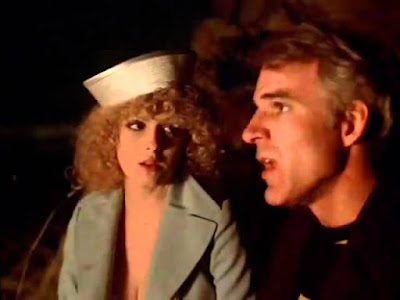An awfully tender moment from one of the funniest movies from my childhood, "The Jerk." Damian and I were reminded of this sweet ditty when we stumbled upon it after watching "Meet Me in St. Louis" over the holidays, and wondering what to make of the song "Under the Bamboo Tree"* ... which Steve Martin also performed in "The Man With Two Brains" and clearly wasn't his or Judy Garland's story to tell!
*One could say that "Under the Bamboo Tree" is merely of its time, but here's what one commenter on YouTube had to say about it:
Here are reasons why these lyrics are racist and therefore offensive.
"Down in the jungles lived a maid
Of royal blood though dusky shade"
THOUGH dusky shade implies that the concept of royalty is opposed to the concept of dark skin. That is racist.
"A marked impression once she made,
Upon a Zulu from Matabooloo"
The Zulu tribe is South African. There is no Jungle in South Africa. This is willfully ignorant, flagrantly nonchalant racial stereotyping.
There exists no such place as "Matabooloo". My best guess is that this is a bastardization of "Matebeleland" made up to rhyme with Zulu.
If you're charitable, you might call the reference to a "bamboo tree" (bamboo being a member of the grass family and not a tree) a gaffe that any ignorant person could make. To me it represents more of the same:
"We are permitted to appropriate enough of another culture so that our cute song is novel and exotic, but don't bother checking the facts, because they don't matter. They don't matter because this is a song about a race inferior to our own."
Then things become really offensive.
The chorus is as follows:
"If you like-a me, like I like-a you and we like-a both the same
I like-a say this very day, I like-a change your name.
'Cause I love-a you and lov-a you true and if you-a love-a me
One live as two, two live as one
Under the bamboo tree"
It's a blatant mocking of an African English accent, with deliberately bad grammar for added emphasis. It has clear racial intent from the beginning. It's framed in the ostensibly innocent idea of a love story, but even this is race-driven: a picture of pseudo-love is patronising when viewed from the superior vogue of "sophisticated" romantic entanglement the rest of this movie portrays. The African love story is a mere caricature of the "real" thing.
The rest of the song is in the same vein: the simple happy natives having their simple happy almost-love story. More racially offensive titbits ensue.
The real tragedy of this song in African history is that it was written by two African Americans. This is a fact for a number of reasons, which you can start to read HERE:
tl;dr: This song is full of racial stereotyping and ignorance. It should not be venerated.































No comments:
Post a Comment